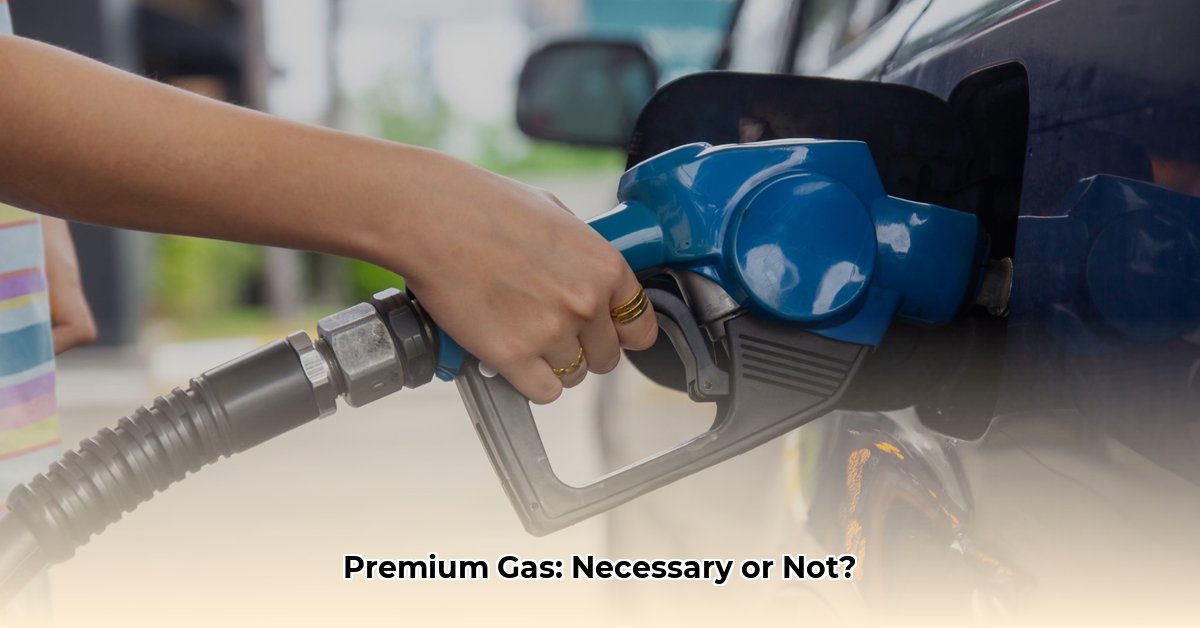Quick Summary: You can put premium gas in a car designed for regular, but it likely won’t do anything. Check your owner’s manual – it’s the final word.
Do You Really Need Premium Gas?
Okay, let’s talk gas. Ever feel guilty skipping the premium button? Like you’re shortchanging your engine? We’re here to bust that myth. This guide covers everything fuel-related: why your owner’s manual is king, what “octane” actually means, and why premium isn’t magic performance juice (unless your car demands it). We’ll even show you how much money you could be saving.
Octane: What It Is and Why It Matters
Octane isn’t a power booster; it measures a fuel’s resistance to “knocking” (pre-ignition). Think of your engine’s cylinders: the fuel-air mix should ignite precisely when the spark plug fires. Knocking happens when this mix explodes prematurely, like a rogue firecracker. This robs your engine of power and can cause damage over time. Higher octane fuels withstand higher pressure and temperature without this premature detonation. This matters most for high-performance, turbocharged, or supercharged engines. They operate under higher pressure and need that higher octane to prevent knocking. Regular gas is typically 87 octane, mid-grade around 89, and premium ranges from 91 to 94.
Premium vs. Regular: Myth vs. Reality
Let’s clear the air about premium gas myths:
-
Myth: Premium cleans your engine. Reality: All gasoline grades contain EPA-required detergents, offering essentially the same cleaning power.
-
Myth: Premium guarantees better fuel economy. Reality: Some drivers might see negligible improvements, but this is likely due to other factors like driving style. Don’t expect miracles.
-
Myth: Premium always means better performance. Reality: Only cars designed for premium will benefit. Putting premium in a regular car is like feeding a goldfish caviar – it might eat it, but it won’t swim any faster.
When Premium Is Required (and Recommended)
Your owner’s manual is the bible for your car’s fuel needs. “Premium required” means just that. Using lower octane can lead to knocking, reduced performance, and potential engine damage. It could even void your warranty. “Premium recommended” suggests premium might offer some benefits, like slightly improved performance under heavy loads, but regular is generally fine. It’s like a wine pairing: it enhances the experience, but it’s not essential. Ongoing research explores the subtle differences in performance and efficiency under various conditions. Some studies suggest minuscule improvements with premium in some standard engines, but rarely enough to offset the cost.
The Placebo Effect: Feeling the Difference
Ever felt your car purr after a premium fill-up, even if it doesn’t require it? That’s the placebo effect. We associate higher cost with better quality, subconsciously noticing things that confirm our belief.
Calculating Your Potential Savings
Ready to see how much you could save?
-
Price Difference: Subtract the regular gas price from the premium price.
-
Annual Fuel Consumption: Divide your annual mileage by your car’s MPG (found in your owner’s manual or online).
-
Potential Savings: Multiply the price difference by your annual fuel consumption.
Example: Premium is $4.00/gallon, regular is $3.50/gallon (difference: $0.50). You drive 15,000 miles annually, and your car gets 30 MPG (annual consumption: 500 gallons). Your potential savings: $0.50/gallon * 500 gallons = $250.
Fuel Type Comparison Chart
| Fuel Type | Octane | Cost | Benefits (for appropriate vehicles) | Recommended Use |
|---|---|---|---|---|
| Regular | 87 | Lowest | Standard performance, cost-effective | Most cars |
| Mid-Grade | 89 | Moderate | Potential slight benefits in some vehicles, check owner’s manual | Check owner’s manual |
| Premium | 91-94 | Highest | Prevents knocking, maximizes performance in high-performance engines | High-performance, turbo/supercharged engines |
FAQ: Your Premium Gas Questions Answered
-
Q: Are octane boosters worth it? A: They might help in specific situations (like towing heavy loads in a car that recommends premium). But they’re often not cost-effective and can sometimes cause problems. It’s best to check your owner’s manual.
-
Q: Why is my engine knocking? A: Several things can cause knocking: using fuel with too low an octane rating, carbon buildup, or other mechanical issues. Consult a mechanic for diagnosis.
-
Q: How often should I clean my fuel system? A: Check your owner’s manual. Modern gasolines have detergents, so you likely don’t need to clean it as often as you might think.
The Bottom Line: Don’t Waste Your Money
Can you put premium in any car? Yes. Should you? Unless your car requires it, you’re probably burning money. Your owner’s manual is the ultimate guide. Trust it, and save your cash for something more enjoyable.
- How to Stop Apps From Running in the Background to Boost Your - December 1, 2025
- How To Move Apps On Your Droid For Better Organization - November 30, 2025
- How to Move Apps on Android for Better Organization - November 29, 2025










